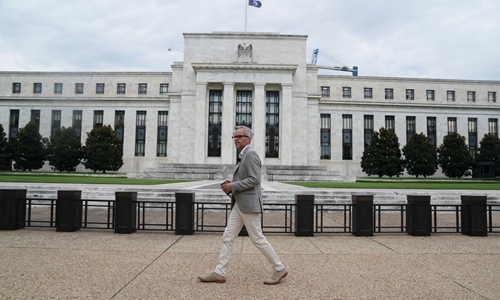HOME >> SOURCE
Global inflation on the way after US adopts ‘helicopter money’
Source:Global Times Published: 2020/3/22 22:18:40

A man walks by the US Federal Reserve building in Washington D.C., the United States, on July 31, 2019. (Xinhua/Liu Jie)
The Trump administration is reportedly planning to send Americans relief payments totaling $500 billion as part of a massive stimulus package to alleviate economic shocks caused by the coronavirus pandemic.While direct cash transfer seems like an unusual stimulus measure for policymakers to take, in essence, the way the US handled the financial crisis has never seen much change over the years. The Federal Reserve always opts to stave off economic downturns and contractions by printing large sums of money, even though it may cause a global inflation problem and leave the world to shoulder its crisis-handling costs.
If anything, this time, helicopter money will come at a scale bigger than ever in the face of the looming economic crisis, as the coronavirus shock is believed to be unprecedented and completely different from the previous crises.
The Dow Jones Industrial Average just ended an 11-year bull market, representing a stunning turn in investors' view of the future economy that could be quickly tipped into a recession. Even the Fed's emergency stimulus measures cannot calm the market, which instead made investors more panicked about what to come with the escalating outbreak.
Meanwhile, risk aversion has driven investors to pile into the safe-haven US dollar, which has long been viewed as the world's safest and most stable currency. Even the Fed's recent decision to cut interest rates to near zero hasn't weakened the appeal of the dollar, which has been unexpectedly strengthening over the past weeks. The US Dollar Index, which measures the price of the dollar against a basket of other currencies, gained 8.25 percent from March 10 to 19, which is a significant appreciation in the world of currencies.
Yet, the unusual dynamic of the dollar doesn't bode well for the US. For starters, a strong dollar hurts US manufacturers as it makes US exported goods more expensive for the rest of the world.
Fundamentally speaking, the US money-printing response has become an inevitable trend and is at the expense of the economy. The US dollar is the world's reserve currency and the major currency for global trade. And it is because the dollar's financial hegemony that the world will have to shoulder the consequences of US massive quantitative easing.
As a result, severe global inflation is on the way. Gains in commodities prices will soon be spreading to all products worldwide, leading to soaring asset prices, and its impact will be felt in the real economy eventually.
As one of the biggest creditors of US debt, China needs to be vigilant about the impact of the US money-printing, with proper precautions made to its foreign exchange reserve structure.
Posted in: GT VOICE